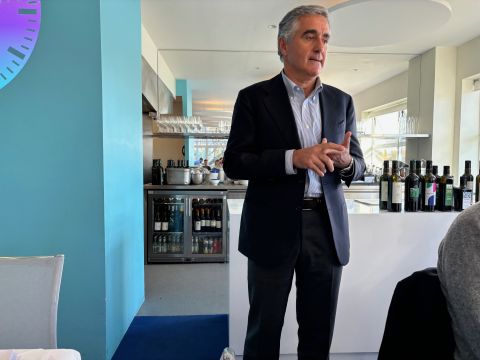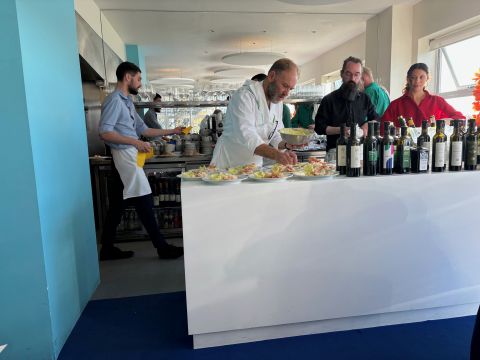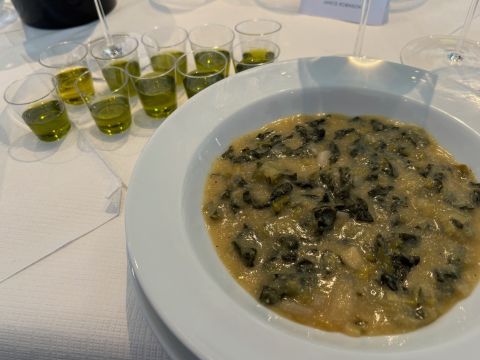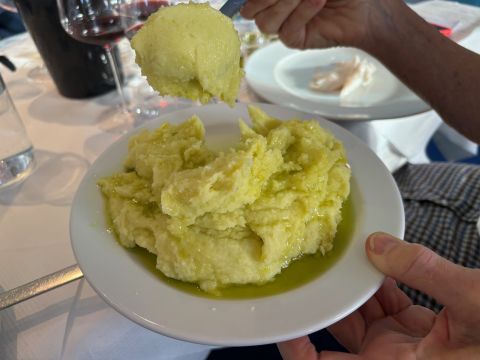The olive grove and the vineyard have much in common. Each produces a single fruit whose harvest is at the mercy of the seasons. Each is susceptible to climate change. Their harvests, almost concurrent, mark an important date in their region. And each has distinctive varieties of which Italy boasts a great many: over 500 varieties of olive tree and about 400 varieties of vine.
Although owning a winery has over the past couple of decades brought greater renown than owning an olive press, there is no doubting how fundamental olive oil is to the cooking of all the Mediterranean countries and beyond. French, Greek, Spanish, Portuguese and Italian cooking would be unimaginable without a good glug of olive oil.
One other factor that links the olive and the grape is the pride of all those involved in their production. This was amply evident when last week five of the top producers of Tuscan virgin olive oil and Tuscan wine were gathered in Sylvia’s, the private dining room of The River Café in west London, to launch their 2024 olive oil. In front of each of us was a sheet of paper with 10 small plastic cups, each clearly marked with the relevant olive oil. Those who had come to taste included Angela Hartnett, London restaurateurs Sam and Samantha Clark of Moro, Henry Harris of Bouchon Racine, Shaun Searley of The Quality Chop House, Johnny Smith of Luca and Ruth Leigh (Rowley’s daughter) of Updown Farmhouse in Kent.
They had been brought together for this event, which has been held for more than 20 years, by David Gleave MW, co-founder and chairman of Liberty Wines. The instigator of the event was missing, sadly. Wheels were set in motion by the late Rose Gray, co-founder of The River Café with Ruthie Rogers, who had voiced enthusiasm for the olive oils of their Tuscan wine suppliers imported by Liberty Wines. As long ago as the mid 1990s, Gleave recalled, Gray had waxed lyrical about these olive oils. Such has been the enthusiasm for them since then that today Liberty imported 48,000 bottles of olive oil from Italy in a poor year such as 2023 when prices rose sharply, and 60,000 when Nature has been more generous. The River Café remains the restaurant that takes the most olive oil from Liberty, up to 8,000 bottles a year. Tuscan olive oil is an integral part of their style of cooking.
Since then this ‘extra-virgin olive oil masterclass and lunch’ has become an annual event but one that has rarely benefited from such ‘Italian’ weather. The sun shone. The sky was blue. The river seemed to glisten, giving the mistaken impression that it was the Arno rather than the usually murkier Thames. And, surprisingly, the room was quiet as Gleave got up to speak.
Having welcomed everybody, he soon turned to business. ‘First things first, you all have to choose your main course, a rib eye of beef or turbot.’ There was a brief flurry as the waiters took our orders and then Gleave instructed us.
‘I am delighted to introduce these five Tuscan olive oil producers, all of whom grow their own fruit and press their own oil. The virgin olive oil they produce is very different from that of the volume producers who tend to influence the laws that govern its production. I hope today that what will be shown is the diversity of Tuscan olive oil, a diversity that matches the very different wines they all produce. A little advice. Firstly, tasting olive oil is, I have found, even more difficult than tasting wine. Secondly, and this is impossible I know, try to ignore the colour. And finally, try to look out for the viscosity of each oil, its fruitiness. Olive oil should not be oily.’
In front of us there was an olive oil from Poggiotondo and two from Capezzana; three each from Fontodi and Fèlsina; and one from Selvapiana. Their colours ranged from pale green (the Poggiotondo) to far darker (those from Fontodi and Fèlsina). They all glistened, like the river. Having looked, it was now time to listen, initially to Alberto Antonini, below.
This renowned wine consultant is also a significant producer of olive oil. ‘With my wife, we own 60 hectares on which there are about 3,000 olive trees. 2024 was a far more generous year than 2023 – at least in the beginning. There were plenty of flowers in the spring which is always a reliable sign. But then there was quite a lot of rain in September which severely affected the yield which has been, sadly, very low this year’.
It was then the turn of Beatrice Contini Bonacossi from Capezzana, who is in charge of their olive oil production while her sister Benedetta produces their wine. She began by alluding to the concept of olio nuovo, the new olive oil, the sign displayed outside many Tuscan restaurants at this time of year. ‘The arrival of the year’s new olive oil is endemic to Tuscany. I can still recall my children asking me when it will arrive. It is part of our way of life. We have tried to reinforce this by splitting all our trees, about 26,000, into 100 lots, a return to sharecropping in a way. Different farmers tend the trees and bring in the olives and then everything is split 50:50 and this arrangement ensures that each partner receives enough olive oil for their family for the year.’
Giovanni Manetti, above, recently re-elected president of the Chianti Classico Consorzio, then spoke of the olive oils from his family’s Fontodi estate. ‘Fine olive oil is the equivalent of fine wine: it is an expression of place, of the year’s sunshine, of the overall climate. And as in wine, there is an intangible element involved and that is the pride that we all take in its production. It is simply a part of our lives.
‘Then of course there are the different varieties of olives used and their different properties. Of my three oils, the first is predominantly Moraiolo which gives a rounder flavour, the second is principally Correggiolo, while the third is 100 per cent Correggiolo which I think gives this olive oil extra length and spice.’ Manetti was followed by the equally passionate Chiara Leonini who spoke about her olive oils from Fèlsina and then by Frederico Giuntini Massetti from Selvapiana.
Gleave followed with a couple of more general but important points. ‘The olive oil industry has modernised itself extensively over the past decade. Once the olives have been picked they are all crushed within six hours maximum in hermetically sealed presses and of course many are filtered. There is still some argument over the influence of filtration with some saying it strips out the colour, but there is no doubt that if you want to keep an olive oil for any length of time, filtration does help to maintain its stability.’
With that, Gleave sat down and the nosing, the tentative sipping and the note-taking got underway – just like a wine tasting! My personal favourites were the non-filtered Capezzana, the varietal Correggiolo from Fontodi and the Selvapiana which had the deepest colour, a factor that is incredibly difficult to ignore. But I would happily cook with any of them.
I would be thrilled if my food equalled in any way what we were subsequently lucky enough to enjoy. River Café head chef Joe Trivelli and his brigade obviously had fun. Above they are seen making the maionese di olio nuovo that accompanied the Devon crab. They then went extremely Tuscan with a thick, delicious farinata, a dense soup of cavolo nero topped with Parmesan onto which we could pour any of the 10 olive oils.
Then came the turbot, as soothing as ever. With this was served a side dish described as potato purée with new olive oil. But, as my photo below reveals, this was described the wrong way round: it should have been new season’s olive oil with a bit of potato on the side.
Lunch had been highly instructive. I left with my thirst for Tuscan wines only partially quenched and my enthusiasm for their extra-virgin olive oil piqued.
A few places to buy the olive oils from Liberty Wines:
Edinburgh: Valvona & Crolla
Central London: Hedonism
West London: Golborne Fine Wine & Deli
South London: M Moen & Sons
And The River Café Shop has launched a monthly olive oil subscription plan.
Every Sunday, Nick writes about restaurants. To stay abreast of his reviews, sign up for our weekly newsletter.



















